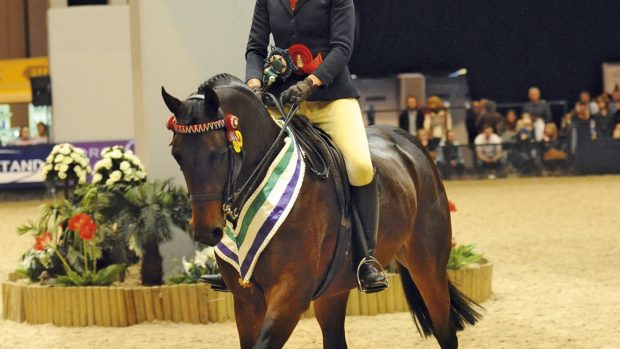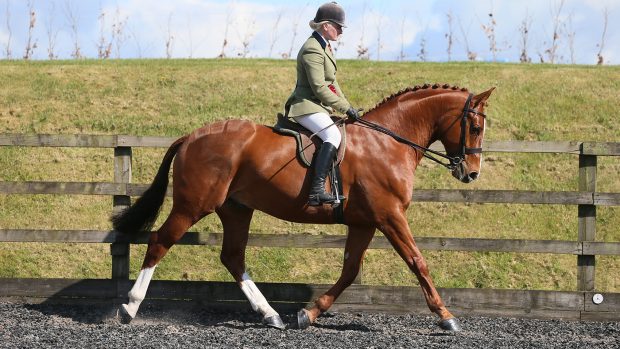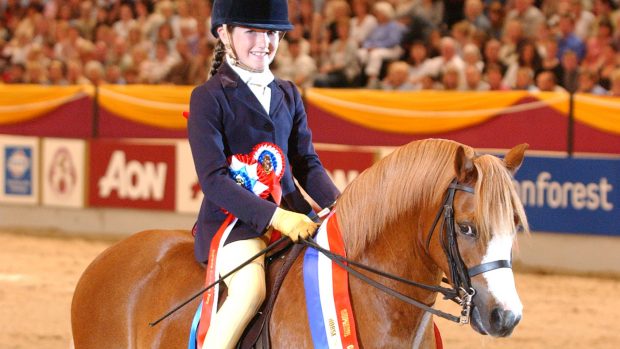When one door closes, another opens. So it is in the life of Emma Maxwell, whose elegant figure is such an integral part of the Arab scene, both at home and abroad.Her parents, Pat and Joanna Maxwell, who both judge, are winding down their world-renowned Lodge Farm Stud at Stadhampton, near Oxford.However, Emma, 28, will not be lost to the show world. She is pursuing a change of direction, now producing Arabs for clients. Her liveries include Malcolm and Jan Hickford’s American-bred two-year-old colt, Sandhiran, and Sam Madgewick’s stallion Ibn Charismma.Joanna explained: “It is because, with anno domini, we are finding the work a bit beyond us, and also it gives Emma a chance to expand the show training side.”
Arabs owned by the Maxwells,the majority of them home-bred, have collected numerous accolades, including countless national, UK international, European and Nations Cup titles, plus a record six privately-bred world titles.
It was in 1962, while living in Dorset, that Joanna bought her first Arab and, having spent spells in North Wales and Somerset, the stud finally settled in 1987 at Church Farm, with its 74 acres and an indoor school.
Starting with English horses, Joanna later added Egyptian blood, after seeing a photograph of the stallion Morafic and buying a colt by him. They also introduced Spanish and Polish elements and their wish for a Russian stallion was realised with the former top racehorse, Mascat.
Joanna said: “We aim to breed a really well-made horse, with solid limbs and balanced movement. We are thrilled with what we¨ve got from Mascat, they are very typey, with decent performance credentials.”
They believe that each bloodline has something different to offer and that their best individuals are outcrosses in terms of nationality, but line-bred in terms of genes.
Last year, their Arabs numbered 100, a sale in June reducing this number to 50, with a further 13 being sold early in 1999. Many will go abroad; the family has exported to 27 countries, including Italy and Jordan, the new home of Heloua and Hazika.
A handful will be retained, including the home-bred Aliha, aged 22, by the Crabbet sire Indian Silver. In addition to her star-studded show career, which included being world champion, Aliha has hunted, been jumped bareback and pulled a sledge in the snow.
Also staying at Church Farm is her grandaughter, Ayat, senior female champion, reserve supreme and best pure-bred at the 1998 Arab National Show and, according to Joanna, “probably the best we¨ve ever bred”.
They also bred Ayat¨s father, Maleik El Kheil, and mother, the charismatic Atlantica, both being by El Shaklan. A legend in her own lifetime, Atlantica, a dual world and single European title-holder, never fails to win the hearts of the crowd.
El Shaklan, bought as a yearling, started his stud career with them and is now the most successful stallion in the world, currently standing in Argentina.
At the 1998 nationals, the stud took the Princess Muna saddle of honour for the eighth time when Aliha gained her third success with a lovely family group, which included Atlantica and Ayat.
They also scooped their fifth success in the sire produce group, this time with Crusader, a feat which has been achieved with five different stallions. Their 1997 victor was the Tersk-bred Mascat, now 24, who is retained and is a great-grandson of the famous Crabbet stallion, Naseem.
The Maxwells will continue to stand the Spanish-bred Borneo, who is syndicated, and Crusader, until he is sold.Crusader is particularly adept at herding the deer and cattle when Emma rides him at home. When breaking young stock, she now uses the Monty Roberts method, having become converted after attending one of his displays.
Emma explains: “My aim for the last couple of years has been to promote a much lighter-handed way of showing to the American style, as I think it appeals to both the horses and the people.”
Although she read psychology at Cambridge, Emma always knew deep down that the Arabs would draw her back. She spends a fair amount of time working abroad, with clients in Sweden, Jordan, Egypt, Spain and Italy.
Although they had a few seasons training Arab racehorses, Emma hasnever been attracted to producing ridden Arabs. She said, “I would have no time to do it properly. I enjoy breaking them and teaching them to jump, but it’s a totally different expertise in the ring.”
Her ambitions are clear cut: “For Ayat to be world champion mare.”
Emma has great empathy with her charges, and few will forget her wonderful display with Aliha when she won the liberty class at the 1994 UK International. It personified the grace and beauty of the Arab horse, together withits affinity with humans



